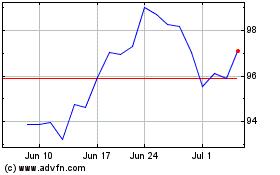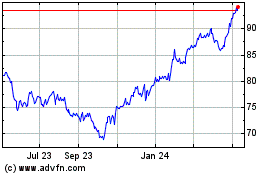Europe Withers, but the World Hopes - Analyst Blog
November 30 2011 - 8:38AM
Zacks
Charles Dickens’ classic ‘A Tale of Two Cities’ begins: "It was
the best of times, it was the worst of times..." Isn’t the world
going through similar moments of despair and hope?
The world hoped and hoped that the economic crisis that started
in 2008 will soon end for the better with bailout packages and
strong government intervention. Instead we faced crises -- a
seemingly never-ending series, one feeding into another. It all
started with the financial crisis in the U.S. that quickly spread
across the Atlantic to Europe, and the Mediterranean ‘drift’ that
grew into a torrent and consumed North Africa and Southern
Europe.
The environment was created by poor governance, spendthrift
ways, economic stagnation and high leverage – a heady cocktail that
ousted governments, and created unstable markets and wobbly
economies across the world.
The emerging markets appear to be the white knight in this
rather grim scenario. Encouraged by the prospects, American and
European companies like HSBC (HBC), Wynn
Resorts (WYNN), Colgate-Palmolive (CL)
and Wal-Mart (WMT) among others are expanding
their businesses in Asia.
According to Mr. Robert Zoellick, President of The World Bank –
the emerging markets have contributed two-thirds of global growth
since 2006. However, in view of the weakened state of the U.S. and
Europe, the emerging nations need new markets to increase trade
flows, drive their growth and that of the world. Mr. Zoellick also
appears to suggest that credit is becoming expensive, which could
hurt.
Charles Dickens had based his classic on the French revolution.
Could we hope for a revolution that would finish off this gloom and
doom in one fell swoop? Very unlikely -- the mess needs to be
cleaned up, and institutions including multilateral bodies, which
apparently lacked the preparedness to combat the crisis, will have
to be capitalized and financial astuteness and discipline must be
made the watchwords for governments and institutions.
Maybe, the situation also calls for radical or disruptive
economics, like dismembering the Eurozone and leaving the countries
to face the Darwinian principle of natural selection. Recovery will
be slow and painful, but future global economic growth will largely
be powered by Asia ex-Japan.
COLGATE PALMOLI (CL): Free Stock Analysis Report
HSBC HOLDINGS (HBC): Free Stock Analysis Report
WAL-MART STORES (WMT): Free Stock Analysis Report
WYNN RESRTS LTD (WYNN): Free Stock Analysis Report
Zacks Investment Research
Colgate Palmolive (NYSE:CL)
Historical Stock Chart
From Oct 2024 to Nov 2024

Colgate Palmolive (NYSE:CL)
Historical Stock Chart
From Nov 2023 to Nov 2024
